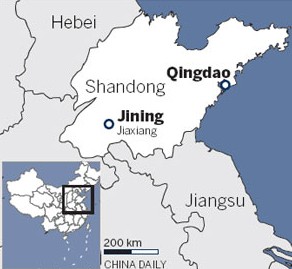
![Workers make gloves at one of the 11 glove-producing factories run by Meng Hongjian. [Photo / China Daily] Workers make gloves at one of the 11 glove-producing factories run by Meng Hongjian. [Photo / China Daily]](U468P886T1D92745F12DT20131216100209.jpg)
Workers make gloves at one of the 11 glove-producing factories run by Meng Hongjian. [Photo / China Daily]

Protecting fingers has turned into a lucrative industry for Shandong sewers
It is early winter, and the sound in the air is an incessant whirring of sewing machines.
"At busy times of the year, hundreds of workers are at those machines about eight hours a day," says Meng Hongjian.
This day, about 100 women are sitting behind rows of sewing machines. Meng, general manager of Jining Yicheng Glove Co Ltd, points out that winter is a slack season for the glove makers.
The factory, in Dazhanglou, Jiaxiang county, Shandong province, is one of 11 such factories that Meng, who has been making and selling sports gloves for more than 20 years, runs.
The company says it turns out 2.2 million pairs a year, ranking it second among the county's 227 glove-making companies in terms of production.
The county produced gloves worth 3 billion yuan ($494 million) last year, 27.5 percent higher than six years earlier.
The industry in the county focuses on sports gloves, mainly for skiing, hunting and shooting, says Wang Ruifeng, deputy director of the county's organization that represents small and medium-sized enterprises.
Ninety-five percent of the county's sports gloves are exported, going to more than 30 countries and regions, including European countries, Japan and the United States.
Jiaxiang accounts for more than 70 percent of China's sports glove exports, Wang says. It exported 72 million pairs of sports gloves last year, accounting for 73 percent of the country's exports of sports gloves, the China Knitting Industrial Association says.
About 80 percent of Jiaxiang's glove businesses are conducted in the form of original equipment manufacturing (OEM), and it makes gloves for global heavyweights such as Reusch of Germany, North Face of the US and Reima of Finland.
It all began in 1987 when a joint venture, Sanyuan Industry Co Ltd, was founded in the county to make gloves for customers in Taiwan. Although that venture eventually folded in the 1990s, it begat thousands of workers and businesspeople in Jiaxiang who eventually knew the business inside out.
Man Changtong, chairman of Jining Glove and Sewing Product Co Ltd, says he owes his success to the joint venture.
"I would not have known how to expand overseas without the experience I gained with Sanyuan," says Man, who worked as a salesman at the joint venture for 10 years. At least 80 percent of the glove bosses in Jiaxiang once worked for Sanyuan, he says.
Man is said to have been the first entrepreneur in the county to have sought out customers by taking part in trade shows overseas.
"The shows brought me more than 80 foreign customers," he says.
Other people in the trade in Jiaxiang followed suit and began to take part in trade shows overseas, too.
To sell their wares, glove company bosses have also climbed on the e-commerce bandwagon. Among them is Li Xianqing, chairman of Jining Tianjiu Industry and Trade Co Ltd, whose company says it has spent 500,000 yuan developing an e-commerce platform since 2005. Online orders account for 80 percent of the company's business, it says.
But many in the industry recognize that it is its abundance of skilled, experienced workers that forms its backbone.
"I tried six times to open a glove-making factory in other cities, but failed because there weren't enough experienced workers," Man says.
Meng says: "A good worker needs at least two years of experience. You can tell how good a worker is just by listening to their sewing machine."
The knitting is crucial to gloves because the tiniest flaw can result in a customer canceling an order, he says.
"In knitted gloves, the knitting structure in particular sections can improve comfort and performance or reduce hand fatigue. That includes varying stitching over the knuckles, which can increase flexibility. Once the knitting is done, finishing treatment can be customized to improve protection in certain areas. Skilled workers can do this more easily than can novices."
To raise skills and quality, the local government is encouraging companies to improve innovation. By the end of last year 47 local companies had set up research and development centers. This has resulted in more than 60 kinds of technology receiving patent protection.
"Without a creative mindset and actions in line with the market, companies will be left behind," says Wang, who sees China's foreign trade upgrading as an opportunity for local companies to build their own brands.
A report published by the Ministry of Commerce in October said China will carry forward policies and measures to encourage companies to boost innovation processes, improve the quality of their products, create global brands and set up international marketing networks.
"Our OEM orders fell substantially in the US and the European Union in 2008 because of the global financial crisis," Wang says.
"We realized we had to develop self-owned brands."
Copyright ©1999-2018
Chinanews.com. All rights reserved.
Reproduction in whole or in part without permission is prohibited.